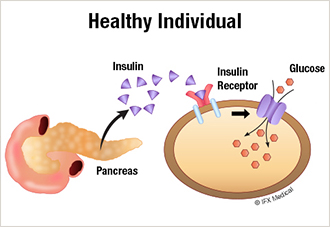Type-2 diabetes is among the most prevalent obesity-related diseases. This is the most common form of diabetes, affecting approximately 90 to 95 percent of the diabetic population. Type-2 diabetes is a preventable health condition that often develops as a result of weight gain.
Factors that increase your chance of developing type 2 diabetes include:
- Age over 45
- Excess body weight
- Genetic history of diabetes
- Low activity level
- Poor cholesterol levels
- High blood pressure
Unlike type-1 diabetes, type-2 diabetes is not a result of the underproduction of insulin. Type-1 diabetes usually presents itself during childhood. While rates of type-2 diabetes among children are growing, this condition most often develops during adulthood.
More than 80 percent of type 2 diabetes cases are in those who are overweight or obese.
About Type-2 Diabetes


Type 2 diabetes develops when the body becomes unable to absorb insulin. Insulin is a hormone naturally produced by the pancreas that regulates the amount of glucose, or sugar, in the blood. The onset of type 2 diabetes is known as pre-diabetes, or insulin resistance.
Your cells require glucose for energy. When the cells become resistant to insulin, glucose becomes unable to move freely into the cell. Your pancreas will try to make more insulin, but over time it may not be able to produce enough, leaving high levels of glucose in your blood. This increases your risk for organ, tissue and nerve damage.
Symptoms of type-2 diabetes include:
- Unquenched thirst
- Increased hunger
- Dry mouth
- Frequent urination
- Nausea
- Chronic fatigue
- Blurry vision
- Tingling in the hands and feet
Often, patients are first informed of their risk of type 2 diabetes with a diagnosis of pre-diabetes, a condition marked by the development of some of the criteria for type-2 diabetes. Pre-diabetes is generally asymptomatic.
Treatment for Type 2 Diabetes
Diabetes is diagnosed through a series of simple blood tests. Patients with type 2 diabetes have abnormally high blood glucose levels, and are encouraged to manage blood glucose through dietary changes, medication and in some cases insulin injections.
Weight loss is one of the most effective methods of treatment for type-2 diabetes. Because bariatric surgery results in weight loss and requires dietary modifications and exercise, it has proven effective at improving insulin-resistant diabetes. In some cases, the onset of type-2 diabetes can be entirely reversed through lifestyle changes, medications and weight loss.


